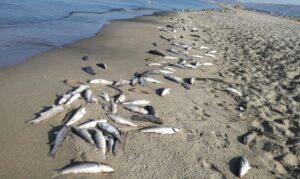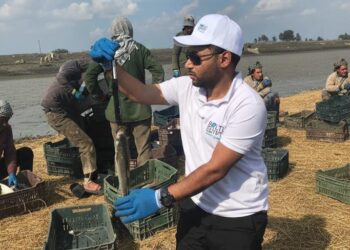Ending Blast Fishing: lessons from Tanzania and a wake-up call for the Blue Economy _ For decades, blast fishing (also known as dynamite fishing) has been one of the most destructive illegal practices threatening marine ecosystems across the globe. It’s a method as brutal as it is simple: throw a stick of dynamite into the water, wait for the explosion, and scoop up the stunned or dead fish that float to the surface, not considering the huge damage for the environment.
While it may seem like a quick way to catch fish, the long-term damage is catastrophic. According to the Food and Agriculture Organization of the United Nations (FAO), blast fishing not only kills target species but wipes out entire schools of juvenile fish, destroys coral reefs that take centuries to grow, and undermines the productivity of coastal fisheries on which millions of people depend. FAO reports highlight that even a single explosion can turn a living coral reef into rubble, disrupting the complex food chains that sustain ocean life.

A Personal Memory from the Mediterranean
As the author of this article, this news from Tanzania resonates with me on a deeply personal level.
Growing up on the shores of the Gulf of Taranto in southern Italy, I witnessed blast fishing being practiced almost as a normal routine. In my childhood, it was not uncommon to hear underwater explosions.
At that time, there were almost no ways for citizens to alert the authorities. It was only with the use of mobile phones, which allowed people to instantly report illegal activities and become direct contact points for authorities, that this destructive practice began to be effectively tackled and gradually disappeared from our waters.
I remember how some local fishermen used dynamite as if it were their most profitable fishing gear. Accidents were frequent. I still remember how deeply it struck me to hear the story of a former fisherman, by then a fishmonger, who had lost a hand in an explosion and had to change his life, yet he recounted it with a sort of reckless, almost pirate-like pride.
After each blast, the sea surface would suddenly fill with floating fish. The explosions shattered their backbones and damaged their swim bladders. Criminal-fishers would rush to collect just a few kilograms of the most valuable species, while tons of dead fish sank to the bottom. It was sheer devastation. The seabed was left littered with lifeless bodies, wasted for nothing.
Often, they targeted schools of mullets, using dynamite just to capture the few large predators, like sea bass. All the mullets and juveniles died, yet almost none were collected. Even today, I remember how fish killed by blasts could be recognized easily at local markets: their backbones broken, their flesh soft and inconsistent.
Tanzania’s Breakthrough
In this context, Tanzania’s recent announcement stands out as a beacon of hope. The Ministry of Livestock and Fisheries declared that blast fishing has been eliminated in its coastal waters, after years in which the country recorded up to 20–24 incidents per day. This milestone was shared during a regional forum on illegal fishing in East Africa, organised by the Jahazi Project.
National Geographic has previously reported on the scale of the problem in Tanzania, describing how coastal waters were once regularly shaken by underwater blasts, leaving behind “fields of broken coral and declining fish stocks” and severely affecting local tourism and livelihoods.
Now, however, the picture is changing. Dr. Baraka Sekadende, Assistant Director of Fisheries, credited the success to modern tracking systems, stricter law enforcement, and improved coordination among national agencies. Tanzania has also established special marine zones and introduced a Blue Economy Policy in 2024, aimed at enhancing surveillance, attracting sustainable investment, and recovering the estimated $42–85 million lost annually to illegal, unreported, and unregulated (IUU) fishing.
A Problem That Persists Elsewhere
While Tanzania celebrates progress, blast fishing continues in other regions, including parts of the Mediterranean and North Africa. In Libya, local reports describe the use of homemade explosives by fishers who damage not only marine habitats but also traditional fishing gear. In Lebanon, dynamite fishing has re-emerged in some coastal areas, driven by economic hardship and weak enforcement.
The FAO warns that poverty, lack of alternative livelihoods, and limited enforcement capacity are the key drivers that keep destructive fishing practices alive. In many cases, local communities know the damage caused but feel they have few other ways to survive.
The Way Forward
Tanzania’s success shows that turning the tide is possible. But it requires a combination of firm political will, technology, enforcement, and community engagement. FAO recommends a multi-pronged approach: strengthening legal frameworks, improving monitoring and control systems, promoting alternative incomes for fishers, and rehabilitating damaged ecosystems.
Most importantly, blast fishing is not only an environmental crime, it is an economic trap. It destroys the very resource base that coastal communities rely on. The choice is stark: short-term gains for a few, or long-term sustainability for many.
A Call for Action Across the Blue Economy
If the Blue Economy is to deliver on its promise, creating jobs, ensuring food security, and sustaining marine ecosystems, then eliminating destructive practices like blast fishing must be a shared priority across regions.
Tanzania’s story offers a powerful message: with the right policies, collaboration, and determination, even the most entrenched illegal practices can be stopped. It is now up to other coastal nations, from the Mediterranean to the Indian Ocean, to follow that lead, before the damage becomes irreversible.
Ending Blast Fishing: Lessons from Tanzania and a Wake-Up Call for the Blue Economy
For decades, blast fishing — also known as dynamite fishing — has been one of the most destructive illegal practices threatening marine ecosystems across the globe. It’s a method as brutal as it is simple: throw a stick of dynamite into the water, wait for the explosion, and scoop up the stunned or dead fish that float to the surface.
While it may seem like a quick way to catch fish, the long-term damage is catastrophic. According to the Food and Agriculture Organization of the United Nations (FAO), blast fishing not only kills target species but wipes out entire schools of juvenile fish, destroys coral reefs that take centuries to grow, and undermines the productivity of coastal fisheries on which millions of people depend. FAO reports highlight that even a single explosion can turn a living coral reef into rubble, disrupting the complex food chains that sustain ocean life.

Tanzania’s Breakthrough
In this context, Tanzania’s recent announcement stands out as a beacon of hope. The Ministry of Livestock and Fisheries declared that blast fishing has been eliminated in its coastal waters, after years in which the country recorded up to 20–24 incidents per day. This milestone was shared during a regional forum on illegal fishing in East Africa, organised by the Jahazi Project (https://jahaziproject.org/).
National Geographic has previously reported on the scale of the problem in Tanzania, describing how coastal waters were once regularly shaken by underwater blasts, leaving behind “fields of broken coral and declining fish stocks” and severely affecting local tourism and livelihoods.
Now, however, the picture is changing. Dr. Baraka Sekadende, Assistant Director of Fisheries, credited the success to modern tracking systems, stricter law enforcement, and improved coordination among national agencies. Tanzania has also established special marine zones and introduced a Blue Economy Policy in 2024, aimed at enhancing surveillance, attracting sustainable investment, and recovering the estimated $42–85 million lost annually to illegal, unreported, and unregulated (IUU) fishing.
A Problem That Persists Elsewhere
While Tanzania celebrates progress, blast fishing continues in other regions, including parts of the Mediterranean and North Africa. In Libya, local reports describe the use of homemade explosives by fishers who damage not only marine habitats but also traditional fishing gear. In Lebanon, dynamite fishing has re-emerged in some coastal areas, driven by economic hardship and weak enforcement.
The FAO warns that poverty, lack of alternative livelihoods, and limited enforcement capacity are the key drivers that keep destructive fishing practices alive. In many cases, local communities know the damage caused but feel they have few other ways to survive.
The Way Forward
Tanzania’s success shows that turning the tide is possible. But it requires a combination of firm political will, technology, enforcement, and community engagement. FAO recommends a multi-pronged approach: strengthening legal frameworks, improving monitoring and control systems, promoting alternative incomes for fishers, and rehabilitating damaged ecosystems.
Most importantly, blast fishing is not only an environmental crime, it is also an economic trap. It destroys the very resource base that coastal communities rely on. The choice is stark: short-term gains for a few, or long-term sustainability for many.
If the Blue Economy is to deliver on its promise, creating jobs, ensuring food security, and sustaining marine ecosystems, then eliminating destructive practices like blast fishing must be a shared priority across regions.
Tanzania’s story offers a powerful message: with the right policies, collaboration, and determination, even the most entrenched illegal practices can be stopped. It is now up to other coastal nations, from the Mediterranean to the Indian Ocean, to follow that lead, before the damage becomes irreversible.
Ending Blast Fishing: lessons from Tanzania and a wake-up call for the Blue Economy






